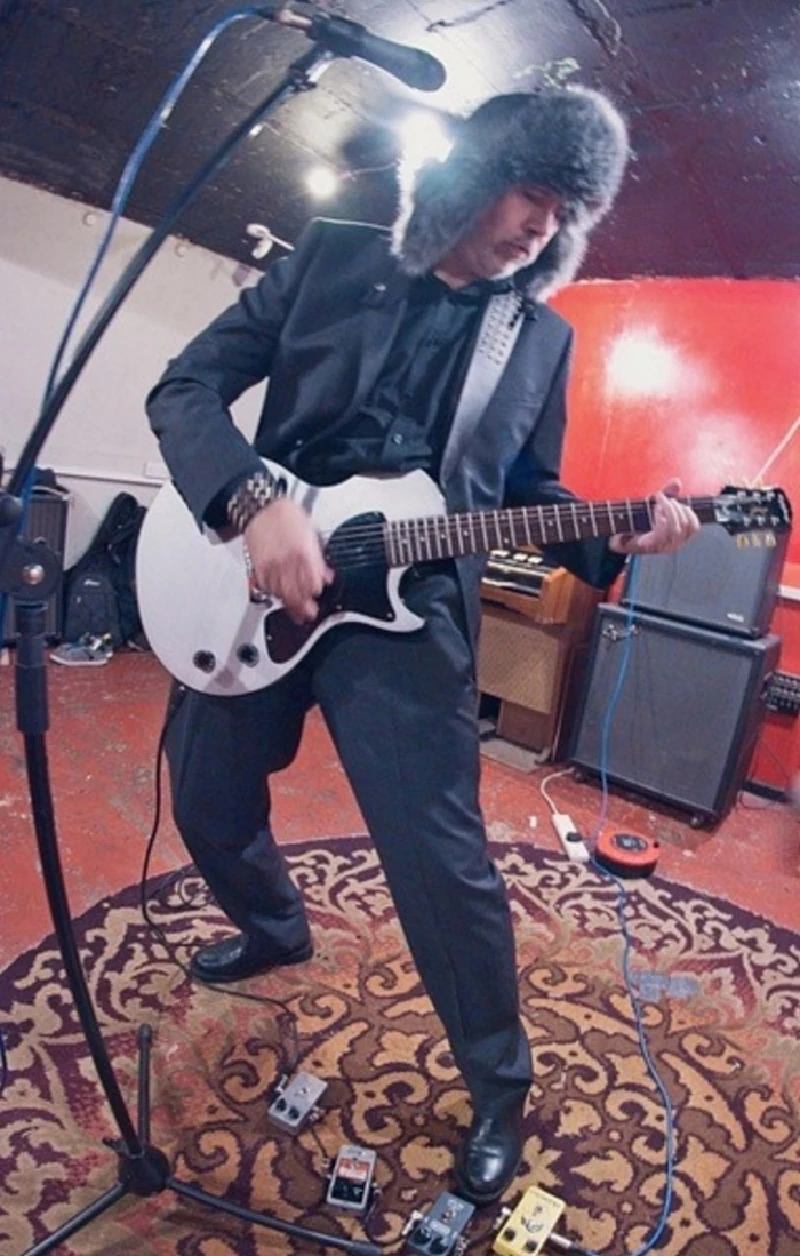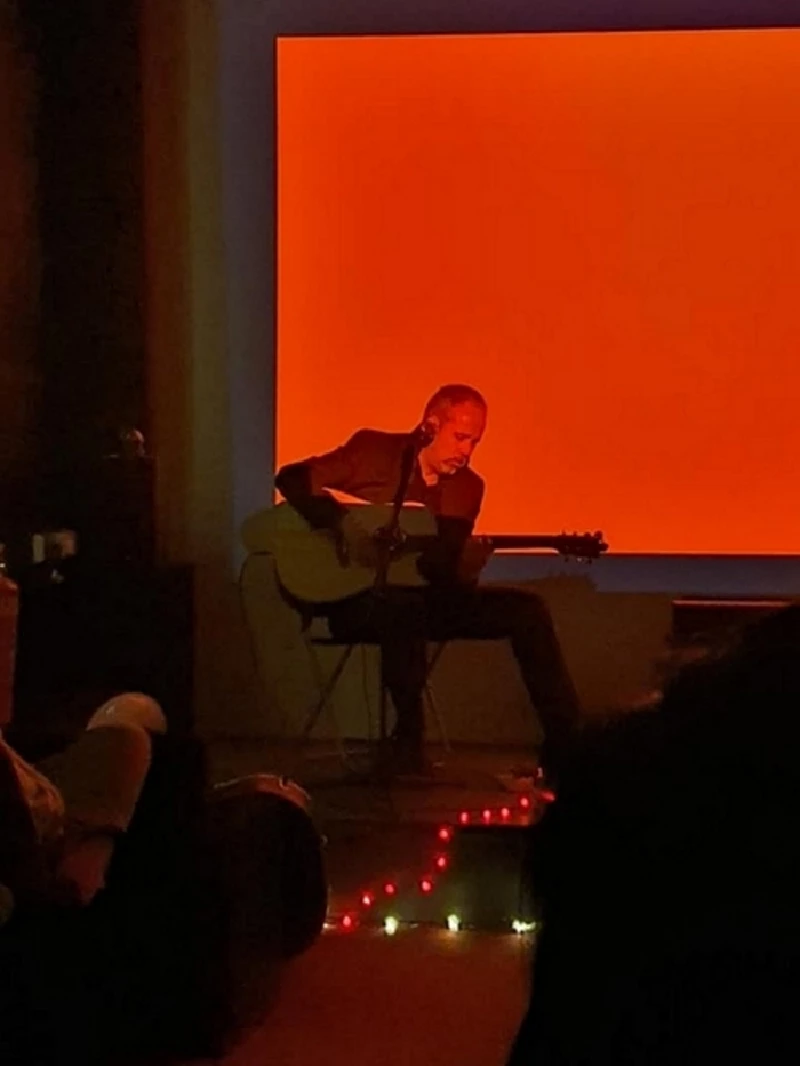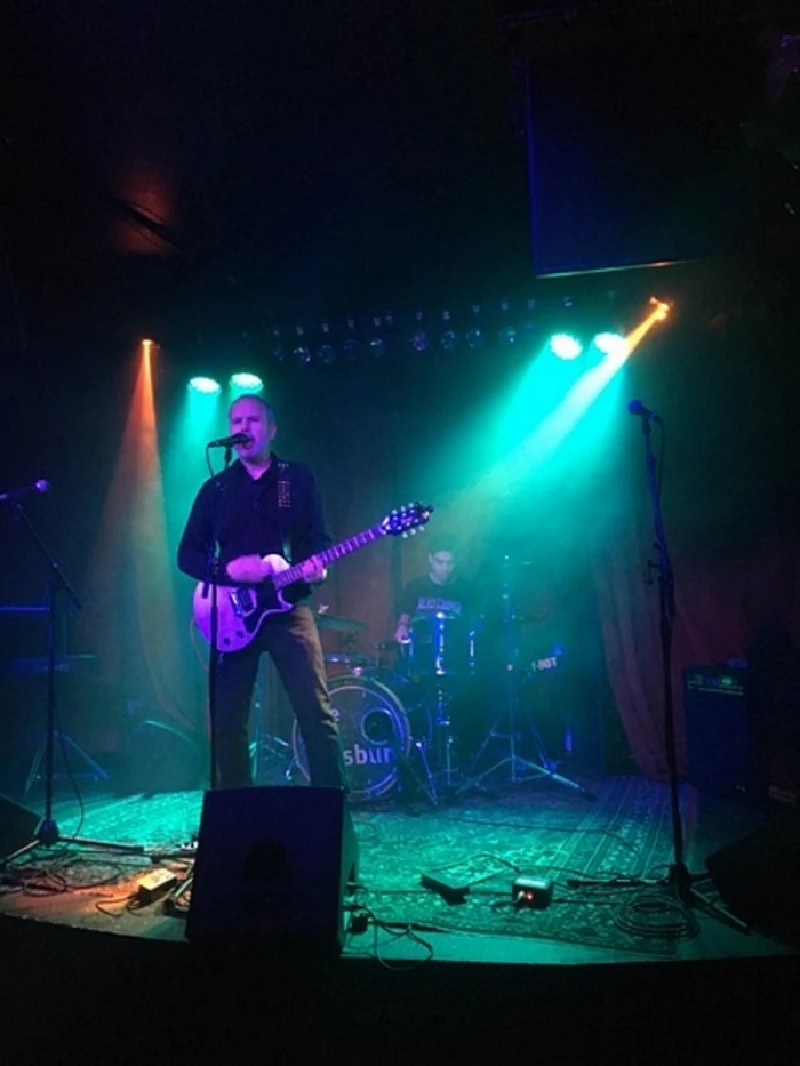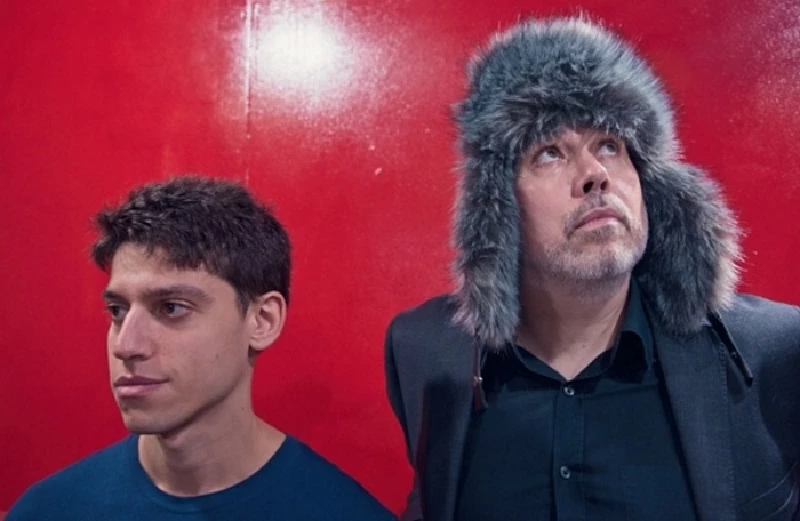Eugene Coyne - Interview
by John Clarkson
published: 23 / 2 / 2020

intro
London-based singer-songwriter Eugene Coyne talks to John Clarkson about his fifth album and 'pop metal' record, which is the first of his records that he has written and recorded on the electric guitar.
Eugene Coyne’s fifth album ‘Counterstrike’ is a change of focus for the London-based singer-songwriter, having been both written and recorded on the electric rather than the acoustic guitar. Coyne has described ‘Counterstrike’, which he has self-released digitally and in a limited edition of two hundred copies on CD, as being a ‘pop metal’ album. With its eleven tracks segued together, grinding guitars and not-a-note-wasted lo-fi minimalism, it is a powerful, abrasive record that grows on its listener with each new hearing. Eugene Coyne’s stream-of-consciousness lyrics and frequently darkly sardonic vocals reflect on the world in crisis and on the edge of impending meltdown as well as the greediness and madness of our political leaders. Pennyblackmusic spoke to Eugene Coyne about ‘Counterstrike’. PB: You describe an apocalyptic vision of the world in your lyrics in which it is a “black cauldron of horror”, weapons of destruction only get bigger and there are “children in cages ready for war,” and the only option is to “counterstrike” this. How do you that without resorting to violence oneself? EUGENE COYNE: I’m painting with a broad brush, but hopefully there’s some humour. It’s not all doom and gloom. The world right now often feels hard and hostile, and that found its way into the songs, perhaps in a way it hadn’t done before. But there’s a lot of love too, and I feel optimistic… Then sometimes I don’t, and violent revolution seems the only solution, the only way to overthrow those who have so much power and will not share it. I don’t have an answer. PB: You have segued the eleven tracks on ‘Counterstrike’ together. Why did you decide to do that? At first the music seems much of a muchness, but with each new listen you realise that there is much more going on and it is a much more complex album than it seems initially musically. Was that intentional? EC: On this album I deliberately restricted the number of instruments, so there are no acoustic guitars, or keyboards playing the melody… I wanted more focus, a stronger sense of continuity and more forward momentum. The production is harder too. But, yes, the way that the songs flow together is deliberate. I love it when bands move straight from one song into another, whether live or on record, and it’s something I take a lot of pleasure in doing myself, especially live where we’ll often play a thirty minute set with perhaps one break to check my tuning… As for the album, I do think it bears repeated listening. There’s lots to discover, and most of it is deliberate. Repeated riffs and phrases, lyrics and ideas. But chance plays a part too, and the subconscious. There are elements I can’t be aware of, and I enjoy discovering them too. PB: Your previous four albums have all been acoustic, but you switched to electric for this new record after finding an electric guitar and amp being thrown away while you were out for a walk. Was it difficult learning to play the electric guitar after so long focusing on the acoustic guitar? Has that changed things vocally for you? EC: It wasn’t difficult learning to play electric guitar, but it is different and it has its challenges. Just a simple thing like standing up and playing, rather than sitting down, for example… I hadn’t done that in a long time. But after playing an acoustic for so long, I suddenly found that I could play a lot of things I couldn’t before, string bends and riffs that were much easier on lighter strings. My fingers are strong! Vocally, the biggest change has probably come from playing the songs live, both solo and with a drummer...putting the songs across with force and clarity, and trying to find a way to be at 100% as both a singer and a guitarist. Usually it feels like something has to give, and I don’t want to compromise. So the arrangements become more streamlined, the concentration and focus increases… I don’t consider myself a guitarist, and sometimes I’m playing songs live that are technically beyond me. And I wrote them! PB: You didn’t apparently record home demos for ‘Counterstrike’. Do you think that benefited this album? EC: Not just ‘Counterstrike’. I don’t demo anything. Part of it is the technical side..it doesn’t really interest me, and it’s not something I want to learn. Instead I jot down the lyrics and keep the chords in my head. I tend to think if I can’t remember them they’re probably not worth remembering, and I should write a better one. Once I have what I consider an album ready, with the songs sequenced so they all sit nicely side by side, I start to think about recording them. That’s how it was with ‘Counterstrike’, although I did drop one song and write another to replace it. As for benefiting the album… I don’t know. It makes the process slower, because there can be more dead ends, as elements are added to the basic guitar and drum takes. But there can be unexpected breakthroughs and flashes of inspiration, and I especially like the way that I’m working on something as a piece, rather than just an odd collection of songs. Although that has its place too. PB: You have described this album as a “pop metal” album, “something like 'Dressed to Kill' by KISS with heavy, needle-y James Williamson 'Raw Power'-style solos.” Some of your long-term fans of the earlier acoustic records might be surprised by those influences. How long have you been a fan of those records? EC: A long time. I grew up in a home where there was lots of blues and rock, lots of all kinds of music. George Formby, David Bowie and AC/DC. The Sex Pistols, The Human League and DEVO. My Dad was signed to Virgin, and he would bring home records. Me and my brother were always into music, and we would search out all kinds of things. My friends too. We were all very curious. One discovery led to another. My all-time favourite bands are probably Black Sabbath and Chrome, but I try to listen to all kinds of things and keep an open mind. I really like Roky Erickson, ZZ Top, The Egyptian Lover, Suicide, The Rolling Stones, Al Green, Plasticland, John Fogerty, Alan Vega, Led Zeppelin, The MC5, Kool Keith, AC/DC, Miles Davis, Marc Bolan, Blue Oyster Cult, Link Wray, KISS, Royal Trux, The Stooges, DMZ, The Misfits, The Beach Boys..lots of electronic things, disco things… a bit of everything. At the moment I’m listening to a lot of Rick James. The production is incredible, and his vocals are superb. ’She Blew My Mind (69 Times)’, ‘You and I’ and the 12” of ‘Super Freak’. “When I get there she’s got incense, wine and candle...it’s such a freaky scene.” PB: You also describe your music as “pug rock” and many of the titles on this record have dog-related titles such as ‘Labrador Battle’, ‘Lost Paws’ and ‘White Staffie Magic’. Where is that coming from? EC: Where I am and who I’m with influence me a lot. I try to write about what’s around me. We moved about five years ago, and now we live opposite a park. Because the house was a bit bigger and the park was a bit nearer, the boys could finally have a dog. They chose a pug, and they called him Rocky. I hadn’t wanted a dog at all, and especially not a pug… I used to think they were really ugly. But I very quickly fell in love with him. And Rocky quickly began to worm his way into my writing. He’s all over my last album, ‘Castle Coyne’, and his influence continues to grow. So dogs, as a metaphor and as part of my creative vocabulary, continue to exert a hold. ‘Labrador Battle’ was inspired by an unpleasant woman and her dog that we met while out walking, while the opening line was taken almost verbatim from a conversation with my wife about a local dog that had just been attacked: “In the meadow/Otto was bitten/By a longhaired staffie/From White Horse Lane.” But the song is about more than dogs and horrible people. ‘Lost Paws’ is about loss and not much about dogs, but again, the idea of something “Scratching at the back door/Demanding that I let them in”, was very appealing. As for ‘White Staffie Magic’, that’s ‘Labrador Battle’ again, but turned on its head. An answer record, if you like, in the tradition of The Real Roxanne..‘Pug Rock’ is tongue-in-cheek. It makes me smile, so it’s a good reason to do it. But I do have a pug, and I do play rock. PB: Who are those people with ‘Horrible Tattoos’? Is that song aimed at the National Front and the Far Right in particular, people who might support Marie Le Pen in France or closer to home the nastiest end of the Brexit Party and UKIP Party? EC: No, that’s not the inspiration for that song, although I’m happy with that reading. Fuck them all! PB: ‘Counterstrike’ was recorded like all your albums at OneCat Studios in Brixton, which is also where albums by the Monochrome Set, the Band of Holy Joy and Turin Brakes were also recorded. Why do you keep returning there and what do you think working in OneCat again brought to ‘Counterstrike’? EC: The home of the hits! I’ve known Jon Clayton, who owns and runs OneCat, for a long time now. He’s a really good musician and engineer, and a nice person to work with. Most of the time we’re in synch, and he brings a lot to the recordings: he’s played on most of my stuff, and his bass playing was especially good on ‘Counterstrike’. He’s patient too (mostly), which helps, and OneCat feels like a space where I can experiment, so that’s good too. There are lots of superlatives about OneCat. PB: Your father was the great experimental musician Kevin Coyne. What was the most important thing he taught you musically? EC: It’s not often I see him described as an experimental musician. Usually people describe him as a blues singer, or a rock singer...but experimental musician seems like a good description to me. He was constantly changing, doing new things. Not for the sake of it, but because he was curious about music, and about the world around him. Very restless, and very driven to create. There are lots of things I learnt from him musically, too many things to whittle down easily. But simplicity may be the big one. Being direct, and to the point. Curiosity. Courage. I could go on. PB: How do you hope to promote ‘Counterstrike’? What plans do you have for the immediate future? EC: That’s a good question. It would make sense to hire someone to promote it, but that would cost as much, possibly more, than it did to record the album. If I had the money, or a label backing me, I might think about it. But I don’t. And I’d rather record a new album… So instead I’ll keep playing live, sending out copies for people to listen to, reaching out to like-minded people like yourself. Promoting the album the best way I can, using all means at my disposal. If you want an interview, please contact me. If you want to hear me play, please contact me. I’m easy to find. I’ll play whenever, wherever, either solo or with Dan Meier on drums. Just get in touch. I have a few ideas for some special shows bubbling in my brain, so keep checking my website at eugenecoyne.co.uk. And I have new songs I want to record as soon as I can. In the meantime, I’ll keep putting the word out: “Counterstrike. Aggressive and esoteric. Perfect for driving at speed or petting your pug.” PB: Thank you.
Band Links:-
https://www.eugenecoyne.co.uk/https://eugenecoyne.bandcamp.com/
Play in YouTube:-
Picture Gallery:-




most viewed articles
current edition
Carl Ewens - David Bowie 1964 to 1982 On Track: Every Album, Every SongArmory Show - Interview with Richard Jobson
Colin Blunstone - Thalia Hall, Chicago, 16/7/2025
Bathers - Photoscapes 1
Visor Fest - Valencia, Spain, 26/9/2025...27/9/2025
John McKay - Interview
Billie Eilish - O2 Arena, London, 10/7/2025
Robert Forster - Interview
Sir Tim Rice - Interview
Loft - Interview
previous editions
Heavenly - P.U.N.K. Girl EPManic Street Preachers - (Gig of a Lifetime) Millennium Stadium, Cardiff, December 1999
Oasis - Oasis, Earl's Court, London, 1995
Beautiful South - Ten Songs That Made Me Love...
Pixies - Ten Songs That Made Me Love...
Paul Clerehugh - Interview
Trudie Myerscough-Harris - Interview
Prolapse - Interview
Doris Brendel - Interview
Donovan - Ten Songs That Made Me Love...
most viewed reviews
current edition
Phew, Erika Kobayashi,, Dieter Moebius - Radium GirlsAmy Macdonald - Is This What You've Been Waiting For?
Sick Man of Europe - The Sick Man of Europe
Davey Woodward - Mumbo in the Jumbo
Cynthia Erivo - I Forgive You
Lucy Spraggan - Other Sides of the Moon
Bush - I Beat Loneliness
Alice Cooper - The Revenge of Alice Cooper
Blueboy - 2
Suzanne Vega - Flying With Angels
Pennyblackmusic Regular Contributors
Adrian Janes
Amanda J. Window
Andrew Twambley
Anthony Dhanendran
Benjamin Howarth
Cila Warncke
Daniel Cressey
Darren Aston
Dastardly
Dave Goodwin
Denzil Watson
Dominic B. Simpson
Eoghan Lyng
Fiona Hutchings
Harry Sherriff
Helen Tipping
Jamie Rowland
John Clarkson
Julie Cruickshank
Kimberly Bright
Lisa Torem
Maarten Schiethart